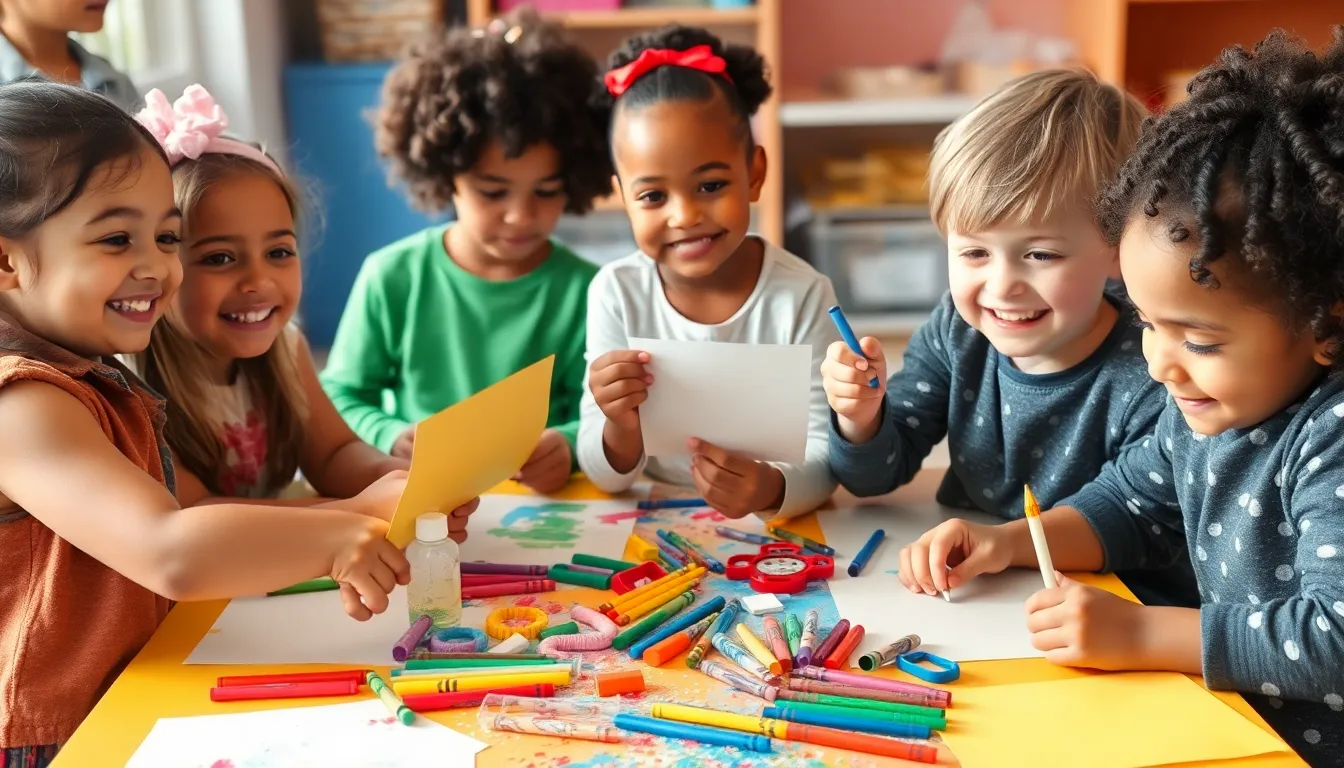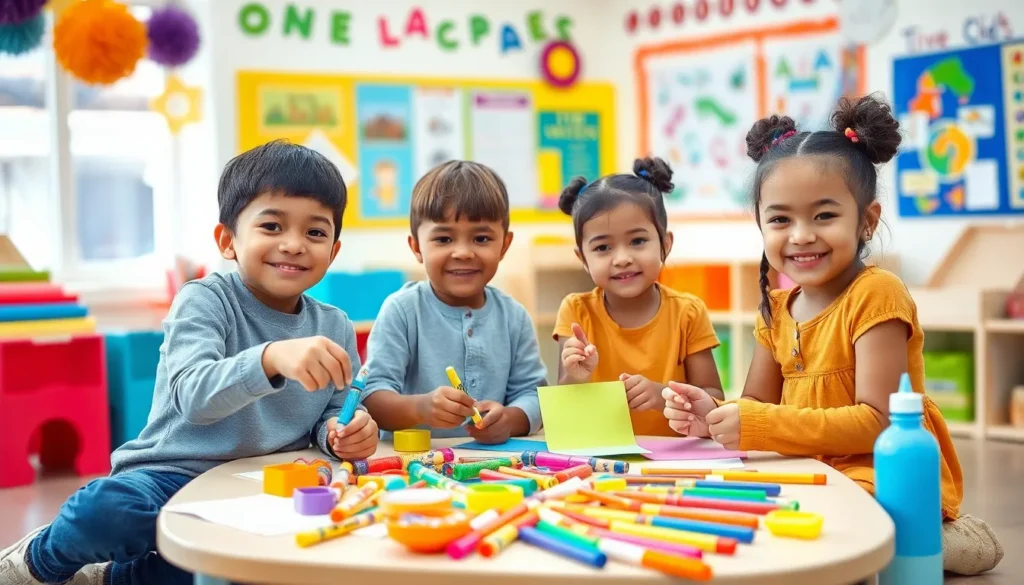Table of Contents
ToggleWhen it comes to preschoolers, keeping their attention can feel like trying to catch a greased pig at a county fair. But fear not! Engaging learning activities can turn that wild energy into productive playtime. With the right mix of fun and education, kids can learn everything from numbers to social skills while having a blast.
Importance Of Learning Activities For Preschoolers
Engaging in learning activities plays a crucial role in preschool development. Activities target various skills like cognitive, emotional, and social growth. Learning activities enrich children’s experiences and stimulate their natural curiosity.
Participating in hands-on activities helps children grasp concepts through exploration. For instance, simple math games can improve counting skills, while storytelling promotes language development. Interactive play encourages teamwork among peers, fostering essential social skills.
Routine learning activities enhance memory retention. Children enjoy learning through repetition, which reinforces their understanding of new concepts. Structured activities help establish a sense of routine, providing comfort and predictability.
Incorporating arts and crafts into learning allows for creative expression. Activities like drawing or building with blocks develop fine motor skills. Craft projects enhance visual-spatial awareness, laying the groundwork for future problem-solving abilities.
Physical activities also contribute significantly to a child’s development. Movement helps improve coordination and balance, while active play can promote overall health. Engaging in group activities encourages cooperation and builds friendships.
Creating a variety of learning activities aids in fostering a love for learning. When preschoolers explore different subjects, they build confidence and become more eager to learn. Combining fun and educational elements makes the learning process enjoyable, setting the stage for lifelong learning habits.
Types Of Learning Activities

Preschoolers engage in various learning activities, providing opportunities for growth and exploration. These activities support cognitive, emotional, and social development.
Creative Arts And Crafts
Creative arts and crafts encourage self-expression and fine motor skills. Children use different materials, like paper, crayons, and glue, to create unique projects. Engaging in art enhances problem-solving skills and nurtures creativity. It fosters imagination as they choose colors and shapes, making each project a personal reflection. Group projects promote teamwork, allowing children to collaborate and share ideas. Incorporating art into daily routines also helps with emotional expression, enabling preschoolers to communicate feelings visually.
Interactive Storytelling
Interactive storytelling captivates preschoolers’ attention while enhancing their language skills. Employing props or puppets makes the stories more engaging and aids in comprehension. Parents or educators can ask questions throughout the narrative to involve children directly. This approach strengthens listening skills and encourages verbal expression, as they share their thoughts and predictions about the story. Storytelling sessions can also introduce new vocabulary and concepts, making learning enjoyable and memorable. Creating a cozy storytelling environment further enhances this experience, fostering a love for reading from an early age.
Physical Activities That Promote Learning
Physical activities play a crucial role in preschool learning, fostering physical development alongside cognitive growth. Engaging in exercise enhances coordination and social skills for preschoolers.
Outdoor Play
Outdoor play offers numerous benefits for preschool learning. Children explore nature and develop gross motor skills while running, jumping, and climbing. Fresh air stimulates cognitive function, and engaging with peers fosters teamwork. In structured activities like scavenger hunts, kids develop problem-solving skills through exploration. Organized games such as tag strengthen both friendships and physical fitness, boosting confidence and social interactions.
Movement Games
Movement games capture preschoolers’ attention while promoting learning. Activities like “Simon Says” enhance listening skills and body awareness, encouraging kids to follow directions. Dancing to music develops rhythm, coordination, and expressive skills, making learning fun. Obstacle courses challenge physical abilities and stimulate critical thinking as kids navigate through the setup. Group movement games also foster cooperation and communication, reinforcing essential social skills necessary for development.
Cognitive Development Activities
Engaging preschoolers in cognitive development activities fosters critical thinking and problem-solving skills. These activities stimulate curiosity and encourage exploration.
Puzzle Solving
Puzzle solving enhances logical reasoning and spatial awareness. Children work with various types of puzzles, including jigsaw and shape sorters. Parents or educators can introduce puzzles varying in complexity, adjusting to the child’s skill level. Completing puzzles builds perseverance as kids learn to stay focused on tasks. Social interaction occurs when children collaborate on puzzles, promoting teamwork. Fun themes can be incorporated, exposing them to different concepts while they play.
Memory Games
Memory games significantly boost concentration and recall skills. Simple card matching games work well to strengthen memory, with cards featuring animals, numbers, or shapes. As children play, they sharpen their ability to remember the position of each card, enhancing cognitive functions. Incorporating storytelling elements into memory games can increase engagement, further developing language skills. Group memory games encourage competition and foster social connections, allowing children to learn from one another.
Social Skills Development Through Play
Learning activities such as play actively promote preschoolers’ social skills. Engaging children in playful interactions cultivates cooperation, communication, and conflict resolution.
Group Activities
Group activities significantly enhance children’s ability to work alongside peers. Children learn to take turns and listen to each other’s ideas during collaborative tasks. Structured games, like building forts, encourage teamwork and flexibility while fostering negotiation skills. Participants practice sharing materials, which reinforces both patience and empathy. Engaging in group projects allows for the development of trust among peers, making social interactions more enjoyable.
Role-Playing Games
Role-playing games inspire imaginative play and deepen social understanding. Children take on different personas, which promotes empathy and perspective-taking. Engaging in scenarios like doctor visits or family gatherings introduces social norms and expected behaviors. Through role-playing, preschoolers practice communication, developing vocabulary while learning to express emotions. These games allow for experimentation with social situations, building confidence in their interactions with others.
Engaging preschoolers in learning activities is crucial for their overall development. By incorporating a variety of fun and educational experiences, parents and educators can ignite a passion for learning early on. These activities not only enhance cognitive and social skills but also foster creativity and cooperation among young children.
As preschoolers explore through play, they build essential life skills that will serve them well in the future. The right blend of structured and unstructured activities ensures that learning remains enjoyable and effective. Ultimately, nurturing a love for learning during these formative years lays the foundation for lifelong curiosity and growth.




